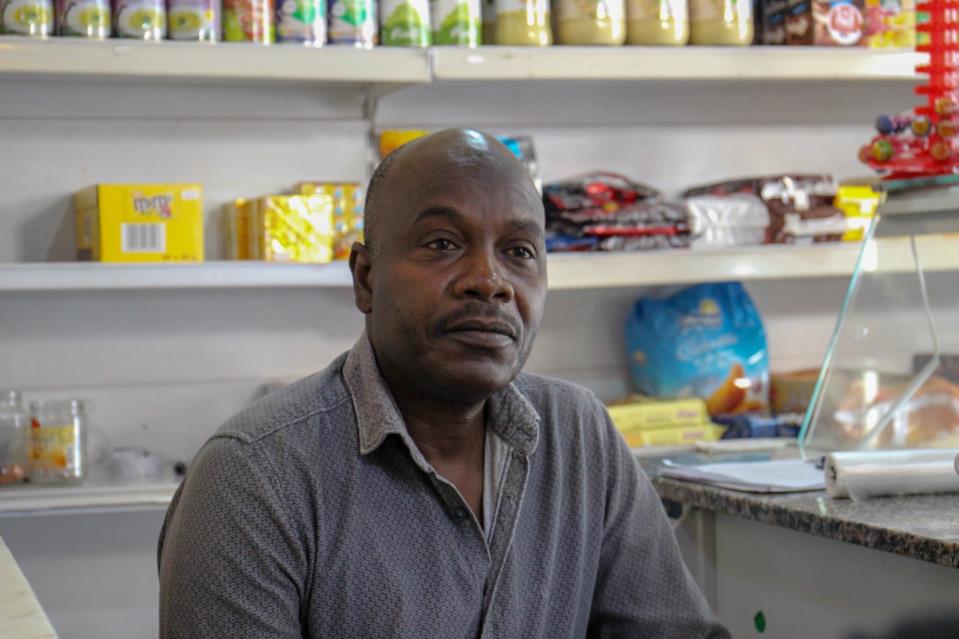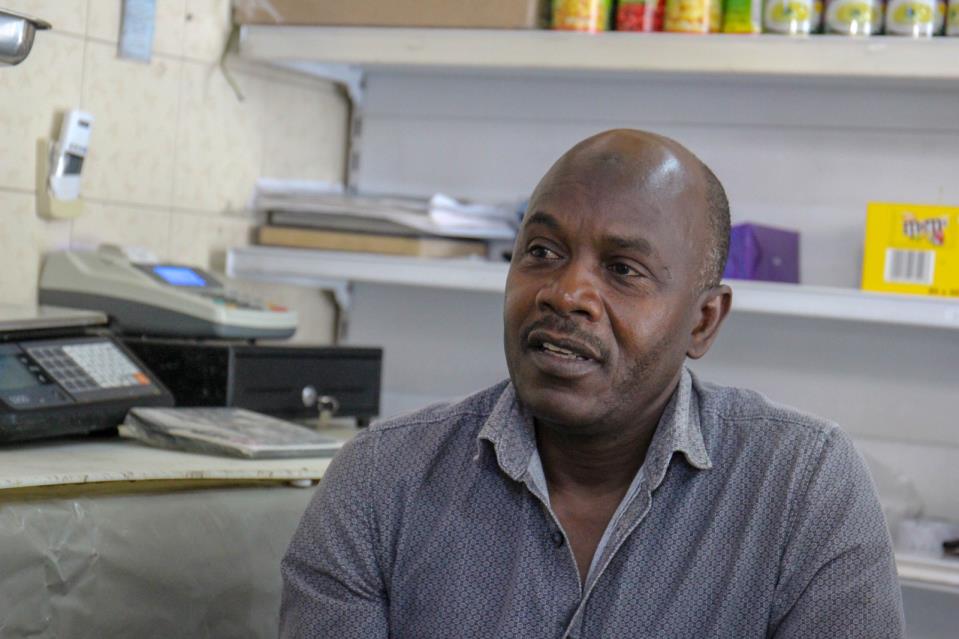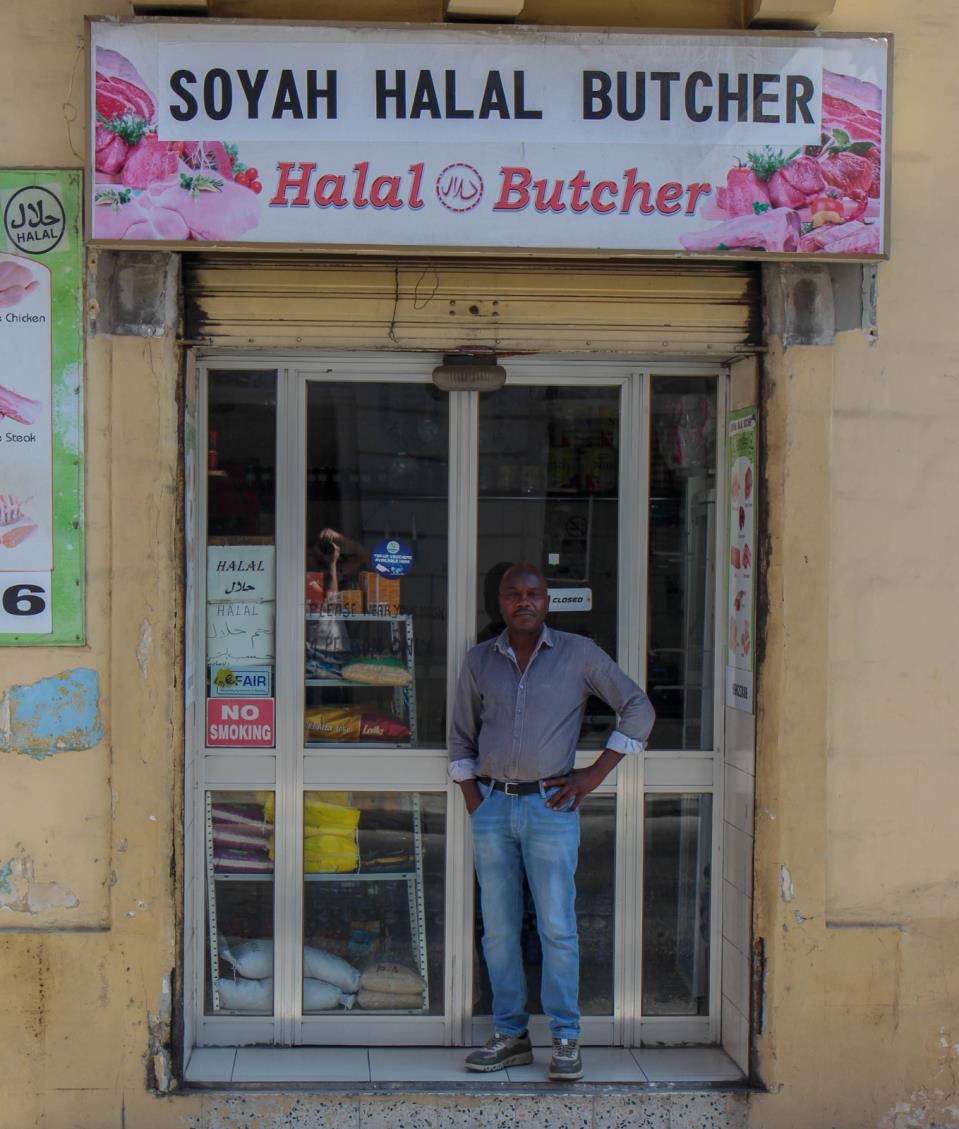Tucked away in Paola you will find a jovial Sudanese owner of a butcher shop who ended up in this position after he survived two conflicts, lost close relatives and friends, experienced racism but has always maintained his ambition and his positive outlook on life.
You will always be greeted with a warm welcome from 52-year-old Mohamed Ibrahim whenever you visit his shop Soyah Halal Butcher & Grocery, which he has owned since 2018. The shop is named after his mother, Soyah, who currently still resides in a camp in Sudan.
“I can say I love everyone. I don't have any barriers between me and other nations. I love everyone and I wish good things for everyone,” Mohamed said.
Mohamed, who has learnt to speak both English and Maltese since he came to Malta in 2011, recounted his full heart-wrenching story to The Malta Independent on Sunday which begins when he became a refugee in 2004, and the atrocities he saw and experienced until he found refuge in Malta, eventually integrating enough to open up his own shop. He still serves as a voice and representative of the Sudanese community of around 600-700 people in Malta.
Although this was a personal interview, Mohamed took the spotlight off himself and appealed to the authorities to reconsider those migrants who have not been granted asylum yet, as some of them have been waiting for over 15 years. He explained that some might have been rejected because there are so many different languages and dialects in Sudan, so some might struggle to express themselves through a translator.
Upon entering Mohamed’s shop, which has a notably rough exterior, this newsroom was greeted with a warm smile, a firm handshake and immediately offered coffee or tea. While brewing the coffee, customers entered the shop calling out Mohamed’s name, evidently showing that this man is popular in the area.
When coffee arrived, he told his young employee to exit the shop and lock it so as not to have any interruptions during the interview. In what felt like an intimate setting; sitting down facing each other behind the glass counter where he serves his customers, both sipping coffee, he began his story.

Sudan 2003: Mohamed caught in a mass genocide of his people
Mohamed was a villager from the region of South Darfur and he was part of the Daju tribe which can be found in the villages surrounding the city of Nyala.
In 2003, his world turned upside down once conflict between the government and rebels broke out.
There was chaos. The village was on fire, people were shouting and gunfire was going off. “As a result, hundreds of thousands of people fled from their villages which were being burned down by the militias… and everyone was displaced to a camp.”
The militias were specifically targeting young men, Mohamed says; as a result, he felt that he had no other choice but to escape. “The idea was to wash the country from the original Africans to replace it with Arab people. There was no mercy for us.”
Unlike Mohamed, his relatives remained in Sudan, including his mother, father, sisters and brother who were all moved to camps after the villages were completely burnt.
There was not much to think about. “You have two options: flee or be killed,” and Mohamed chose the former and fled to Libya in 2004.
Tears building up and visibly emotional, Mohamed said that both a sister and a cousin were “killed”. Pausing for a moment to compose himself, Mohamed strained to say that his “brother was killed” in Sudan around a month ago, nearly two decades after Mohamed initially fled.

Libya 2004-2011: New life in Libya interrupted by another conflict
Following the traumatic events that took place in Sudan, Mohamed was focused on rebuilding his life in Libya and immediately began by trying to get a job. He soon learnt how to spray cars and he began working as a car sprayer in a garage in Tripoli, where he also resided.
“I was doing well, I started my life again in Libya,” he said. He remained in contact with his family while trying to send money to support them from afar.
This life was abruptly interrupted in 2011 when conflict broke out in Libya as well. Mohamed quickly faced reality after a bomb landed 20 metres away from his garage, which was located very close to a military camp.
“But this is war, this is war… it’s very sad… I didn't have any option, we were forced to flee again.”
Mohamed was living around 12km away from the Mediterranean Sea; therefore, it made more sense for him to escape to Europe.
“Yes, I had some friends, unfortunately… they had also been killed. They were my close friends.”
“This is the fact, this happened. It is in my mind, in my soul all the time; I cannot forget this. It is a very sad part of my life and there are many millions of people like this; we cannot forget them, but we have to continue.”
And continue he did, as he embarked on a new journey towards Malta.

Malta 2011: Braving the sea, rescue, detention, freedom
“Our journey started at 1pm. There was fighting everywhere in Tripoli and at the time there were smugglers; they were working very hard to make money. Sometimes they even forced people onto the boat.”
On his way to the coast, he encountered fires, bombing and fighting everywhere and he described everything as being “dizzy”. He could hardly recall how he made it to the coast because chaos broke out all around him so fast, he could not keep up.
One hundred and seventy-one migrants were packed onto the boat and they spent four days at sea, where they experienced rough seas on the last two days. A helicopter hovering above the boat spotted them and then around an hour later the Maltese Armed Forces arrived and rescued everyone on the boat.
“No one thought that we would survive, as the sea was so rough. People were preparing themselves to drown or to die. But eventually, we were rescued.”
Mohamed recalled that they arrived in Malta at the military port in Valletta at around 5am and he was given a tag around his wrist with the number 11B. “The Maltese were very kind,” he said as they were all seen by a doctor, given food and water and later taken to Hal Far detention centre.
Shifting back to a poignant tone, he spoke about someone he met during this journey to Malta and they would spend a lot of time talking. They eventually parted ways as he settled in the USA. Unfortunately, a few months ago, three days after returning to Sudan to see his family, “he was killed”.
At the detention centre, there were over 400 migrants at the time, 24 of them coming from Sudan. After experiencing rough waters, he spent a week feeling nauseous and swaying from side to side as he recovered from the boat journey. But he said that he was just happy to have sheets and a bed to sleep.
“6 months, 11 days and some hours later,” he was granted asylum; what the migrants used to call “freedom”. Since that time, he has lived as a legal resident in Malta.
Mohamed was then moved to Hal Far’s Open Centre where he stayed in the hangar. He spent a year there until he received a letter informing him that he had to find his own accommodation and move out.
Malta 2012-2018: Working in a garage but struggling to be accepted
The first thing Mohamed did when he arrived at the camp was go to the Employment Training Corporation (ETC), today known as Jobsplus, and applied for certification to become a car sprayer, because he realised that in Europe you will not be accepted without certification.
Mohamed further recalled how a friend of his was very kind to him, as he drove Mohamed around Malta to different garages so that he could hand out his CV. His friend helped him write his CV and also taught him how to properly speak and greet himself when applying for a job, during a time when Mohamed could not speak Maltese or English very well.
On the fourth day of the job hunt, he got lucky after someone called him up. Mohamed went to the garage where the boss asked him many questions about his trade to see whether he was good enough to spray cars.
“They were watching me all day to see what I was doing. Then he asked me, ‘how much shall I pay you’ and I told him ‘Listen, let's start working this week until Friday and then you can assess how much I deserve’.”
By the end of the week, he told Mohamed that although he knows how to spray cars, the way Mohamed did it was different from what was usually done in Malta. Therefore, he was offered a low wage with the assurance that after 2/3 months he will be paid like his colleague.
“I told him okay. I had to work.”
“I faced some difficulties in the beginning. To be honest, the first year was a challenge for me, they were good people, of course, but they didn’t treat me well. For example, they never called my name. After one month the boss asked me 'What's your name?’”
Mohamed had reminded the boss of his name, but the boss brushed this off and gave him another more common name, which is more accepted in Western society.
“You do this, you do that, you not like that but like this,” Mohamed said when repeating how he used to be spoken to by his colleagues.
Although he was treated badly, Mohamed defended their behaviour, as he understood that they were treating him this way because they were not familiar with the Sudanese people.
“This happened because of many reasons. First of all, they didn't believe that an African man knows how to spray cars. Secondly, I can say that I was the first black person in that garage. Third thing, he struggled to employ someone whom he didn't know of course. But I proved to them that I am a very good sprayer, this is the good thing.”
Pressed and asked why he reacted in this way instead of lashing out at the way he was being treated, he said: “It is not a matter of being furious, it is a matter of understanding each other. Even if I was angry, I used to absorb this anger. I never showed them that I am angry because I realised that they don't know us and some people didn't like us as well.”
“It is a misunderstanding between us and there are many reasons. For example, we don’t understand each other's languages, so there isn't any communication between us. We don't know how to phrase what we want to say.”
He spent time studying Maltese behaviour and noticed that they would react in certain ways to him and sometimes pass comments. Overall, he said that the majority of Maltese people just do not understand who Sudanese people are, but they are still good people. Therefore, Mohamed became motivated to proudly represent the Sudanese people and educate the Maltese to understand who they are better.
Mohamed’s time working at the garage ended in 2018 after he noticed that he had no contract and he was working irregularly while not being paid very well; so he decided to leave. His boss, Mohamed said, was very sad to see him go and even shed a tear upon receiving the news of his departure.
“Even my colleagues, till today they are my friends and they are wishing me the best.”

Malta 2018 till today: A new venture as a businessman
After struggling to find something new to do, he knew of a Sudanese man who owned a shop in Paola that he intended to sell. Mohamed had some money saved up so he offered to buy the shop from him, however, only if he could pay for it in monthly instalments, which they both agreed to. So Mohamed became the proud owner of Soyah Halal Butcher & Grocery in Paola.
“I had no idea how to run the shop,” he admitted. But he was willing to swallow his pride and learn something new. This occasion was no different as he learnt a lot from a Pakistani man who used to work there. Eventually this man left and he was alone.
Asked about how he runs the shop he said: “I focus on two things. First of all, I have to be nice to my customers and they accepted me. Especially here, as I am dealing with people from different backgrounds, Asian, African, European, Arabs and Maltese. People began to accept me because of how I was treating them."
“Secondly, the suppliers, this is the most important point, you have to be honest with them. For example, when they give you a product you have to make sure that you pay them on time.”
Who is Mohamed Ibrahim?
Lastly, Mohamed was asked to end with a final message: “As Mohamed Ibrahim, like anyone of course, I was someone with big dreams at the beginning of my life… but let’s talk from now; the past is past. I am a very ambitious person and a hard worker as well.”
“Personally, I would like to be a good businessman, why not? That's my dream and I will achieve it. It requires hard work, time and studying but I am doing these things. I am learning from everyone. It doesn't matter how old you are.”